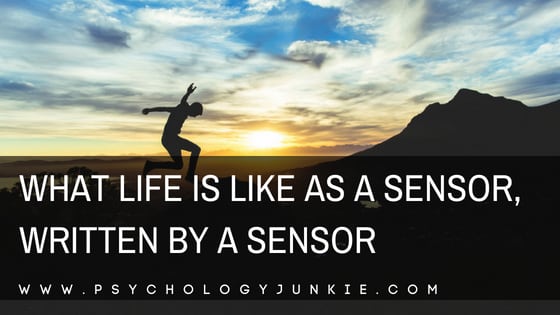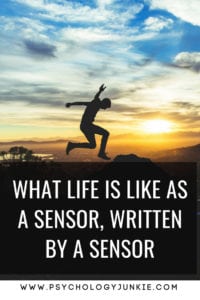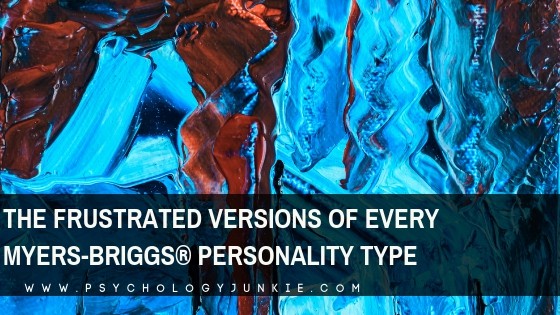What Life is Like as a Sensor, Written by a Sensor
Guest Post by Daniel Storm
A sensor is a sensor is a sensor, right? Well, not exactly. They may have some strong similarities, but there are some important differences as well. A lot of descriptions of sensors seem kind of one-dimensional because most people writing about type are intuitives. As an ESTP, I thought I’d take a shot at writing about life as a sensor from a sensing perspective.

Extraverted Sensing
I’m going to start by trying to explain Extraverted Sensing, or “Se” for short. As an extraverted sensor I am anchored in the reality of the world around me. My senses are well attuned to details so that I can get as much information about what’s happening around me as I can take in. As I’m writing this post I can hear the happy, music-box tune of my son’s preschool show, the dripping of my coffee pot (and the delicious smell of my highly-anticipated refueling), I can see the emerald and crimson shade of the table cloth and the double shadows that are cast on it from the multiple bulbs in our kitchen light. I realize that this information isn’t necessary to me at all for writing this post, but being aware of the world around me isn’t just something I can shut off, nor would I want to.
I want to take as much detail in as possible, and I want to stay tapped into what’s happening around me all the time. Why? Because then I’m prepared if I need to take action. I like stimulation. I like light, sound, sights, textures. Even when I need to focus intently on a project, it’s easier for me when I put on headphones and listen to music at the same time. I NEED the input. Even while I listen to the music on my headphones and work on my project I’m still staying tuned into the environment around me.
I see everything for exactly what it is. I don’t attribute anything to an object that isn’t already there. This helps keep all the information in my brain neatly organized and filed away in just the right categories. Extraverted sensors like me can be very quick to react to what’s happening around them – a kid falling off a chair, someone slipping on the ice, or a car suddenly veering into the wrong lane, because we’re always paying attention and we don’t spend time theorizing unless we have to.
The downside to this function is that we crave the use of our reflexes more than day-to-day life allows. This may be why many extraverted sensors love to get involved in sports and other physical recreational activities. These activities are an outlet for our reflexes which we want to stimulate as much as possible. The problem is, sports are considered a younger activity and something you put aside when you get to be an adult. I could always find a team to join as a teenager, but now as a 36-year-old everyone is done with sports and seems more than happy to sit in their cubicle or lounge around on the couch binging on Netflix.
Introverted Sensing
I grew up with two introverted sensing parents. You would think that just the fact that they were sensors would make us understand each other well. But if you’ve studied type theory for long, you’ll know there are big differences between introverted sensors (SJs) and extraverted sensors (SPs). The clash between my SP personality and their SJ personalities definitely created issues, maybe because I was a kid and just wanted things my way.
Introverted sensors are still quite aware of the world around them but because it’s an introverted function, it’s all about how it relates to them subjectively. When was the last time they heard that song on the radio? Who gave them the sweater they are wearing? Why aren’t we going to that restaurant? Well…that type of food is unfamiliar. It’s all about their experiences and their impressions of that experience. It’s about comparing and contrasting past to present. They like familiarity, routine, structure…all things that make SPs like me feel a little queasy inside.
Of course, introverted sensing can be really valuable because the people who use it often have a good memory for the past and are realistic about the future. They can remember details and lessons and apply them to current situations effectively. They preserve positive traditions (or bad ones if they’re bad guys). They tend to be reliable and keep their word.
I, on the other hand, as an ESTP am incapable of keeping any of my promises and only live for hedonistic, shallow pleasures….wait, sorry…that’s what the personality community would like you to think. But be wary of stereotypes, even if these personality systems are highly-nuanced forms of stereotyping.
My Experience As a Sensor
I remember growing up as the youngest brother of two older sisters. Even though they were four and six years older than me, I was usually able to keep up and compete with them physically. Being as it was the 80’s, we spent A LOT of time playing outside, riding bikes (without helmets), roller skating in the drive way (without knee pads), playing tag, hide-and-seek, swinging on our rope swing and finding as many ways to keep busy as possible. For me, it was perfect. I loved the action-oriented play and was able to compete with children much older than me very quickly. I learned how to ride a two-wheel bike by sitting on the cross bar of my sister’s much bigger bike. I figured out how to cut sideways when being chased to avoid being tagged. All of it was about figuring out how to physically manipulate either myself or the world around me to my advantage, and I loved every second of it. Once I became a teenager I started playing in a church softball league. I loved the challenge and the physical demand it placed on me. I was the pitcher for our team and often had to react quickly when a batter hit a ball right back at me. Sports has given me a rush and excitement for life that has never left me. It requires complete concentration on exactly what is happening in that moment. It’s about reacting at full speed.
The world we live in is designed by sensors. Sensors account for 73.3% of all personality types. We are drawn to the world around us because it was designed for us. This is obvious in the majority of TV Shows, movies, and video games. Special visual and audio effects that provide sensory overload are a delight to an extraverted sensor, but can be overwhelming to an Intuitive. Advertising for the new faster, better looking, better-feeling….thing works for sensors, but doesn’t hold any deeper meaning for the intuitive.
Now none of this is to say that Intuitives don’t enjoy movies or new things or anything like that. But they often get their enjoyment out of them for completely different reasons than we do. So while the type community is over-represented by intuitives, I’ve found that many of them want to have a deeper understanding of sensors. I also think it wouldn’t hurt us to have a better understanding of them!
Daniel Storm is the husband of Psychology Junkie founder, Susan Storm. He loves playing sports, tinkering with technology, gaming, and enjoying life with his wife and five kids! He is an ESTP personality type and is on a quest to rid the world of negative sensor stereotypes!
Other Articles You Might Enjoy:
Hey Intuitives, You’re Not the Only Ones Who Hate Small Talk
4 Major Misconceptions About Sensors
10 Things You’ll Relate to If You’re an ESTP










And, I would say that some sensor may have a taste for the abstract.
I practice skydiving, and I am here. What differentiates me is that I would not pratice psychology as profession. But I like to use psychology in more concrete areas.
First of all. I would love to go skydiving. Second I completely agree about using psychology in a concrete way. I would love for more sensors to at least take the time to learn about type and see all the ways it can be used in everyday life!
Yes I would say that there is a difference between loving the idea, and doing everything to realize this idea… Personally, I left the city to lead a life that allows me to practice more unusual activities.
I think all SeInf can attracted by the idea. But probably the vast majority will never do it because the step between “possibility” and “action” is a bit more complicated than for other type. Especially this type of action. I think you need a major reason. Like defending someone, or making a plan… Or cause the plane is crashing.
But if you have a STP as a husband, this could be done.
This was so eye opening to extroverted sensing! A well written and enjoyable article
Besides, I prefer to use the “strategy” term for INTJ, rather than “plan”. As a Ti Dom, I’m looking for precision, which in some areas, goes hand in hand with planning. And I love that.
The goal is not to communicate my thoughts to organize durably the outside world. But the Maximum impact with the most precision.
Nice article! I’m an ISTP and another thing I’ve noticed is Se is VERY aware of every movement you do or make, very conscious of it. While an Ne-user I know will start doing something and say, “Wait, did I start doing this?/How did I get over here?” and all I can think is, “How can your body be on autopilot, how can you not notice what you’re doing?” It’s pretty funny.
My husband and I both laughed about your comment, because this exact scenario happens to us ALL the time (except I’m the one who doesn’t know how I got somewhere) 🙂
LOL… sooooo true. It can actually be annoying when the only other people around are Intuitives too and are equally spaced out about how I ended up here/there or why I came into the room. They will usually be triggered to talk about something completely random, which of course I get sucked right into, and then I only end up remembering days later that I still haven’t found the thing I was looking for on that day that I got distracted.
GASP. That’s probably why *both* of my best friends are Sensors – I need them to keep reminding me what the hell I’m doing on this planet.
I love being able to read about sensors from a sensor’s point of view. Keep the awesome articles coming, Daniel!
Hello Daniel,
Thank you for the new article. 🙂 This was very informative and it managed to explain the essence of how Se works. It must be fantastic living a life with using Se you are capable of always enjoying the present, this is something many people shall experience.
Sometimes I wish I would be an Se user too so I will be more aware of my body’s needs, the environment around me and last but not least it would be grerat to feel the urge for motion. Instead of it, I am an INTP struggling with all these things. I always bump into things because my thoughts take me into another dimension and I just assume the present moment instead of sensing it as is. As a massive Ne user I must also be conscious because I can easily forgot what my body and soul need and I only realise they need something when I already feel awful. As a solution I literally must ask myself every single hour if I am hungry, thirsty, sad or else. This is something Se users are aware of, isn’t it? 🙂
But the worst of all that I just don’t feel the urge to move. I always prefer just sit or lay down and I don’t want to do sports or go outside, that just exhausts me especially after a long day. I only want to read, to solve a problem calmly, to play video games or to write a story. Motion, doing sports are just disturbing “should haves” in my life. And I know this is unhealthy but I just don’t feel right to start moving.
I would like to change that! I would like to learn this from the Se users, how I can be happy in the present and how to be able to desire to go out and start moving. I really count on your writings so with your help I will be able to change it and live a more balanced life after all. 🙂 So thank you again for this. Have a wonderful day!
Cheers, B
Hello B
Can I know which game you play?
Well, the energy goes in part through the diet. Think about that. In fact, running, cycling, practicing a martial art like aikido. It’s not necessarily Se. It’s a movement repetition, more than real-time adaptation.. You can practice quietly this activities, but with determination. Because in the end, it’s a matter of will. There are also ISTPs who spend their time in front of a computer to play FPS (Se)…
The best thing is to find an interest in a particular sport. For all types.
Hello Caracal, thanks for your thoughts. Yes, you are right, it’s a matter of will. And I am willing to find my unique way to not just be OK with sports but actually love them, eager to move. I would like to find the Thing, that will motivate me. And Se users are very inspiring for me, and I know I could learn from them a lot. Btw, I play with WoW recently with my cute little paladin. 😀
As an ISTP, I enjoyed the article and share the hate for sensor stereotypes. Si and Se certainly does clash, as you mentioned. I’m married to an ISTJ, and you’d think based on the letters that we’re pretty similar, but in reality we think absolutely nothing alike. Sometimes it creates balance.. and other times a really intense disagreement. O_O
Hey, this was a great article and I feel like it certainly cleared some stuff up for me. Probably 90% of the personality tests I’ve taken have said I’m an ESFP. However, I often feel like I fit into too many areas that I struggle to believe I am just an ESFP. It is very confusing, and perhaps it is all the stereotypes.
Regarding Se, I am almost always aware of my surroundings. Background noises distract me easily, I get startled easily from sudden noises so people think I’m really jumpy, I’m aware of lighting and shadows, and I’m usually looking at the fine details of someone face, hair, clothes etc while listening to them talk. I am also one of those people on the road furious at the drivers that don’t seem to be paying attention and I’m usually always aware of what vehicles are around me (save for when I’m driving in the morning without having had a coffee yet, lol.)
Where I struggle with this is what you said about SPs being driven towards sports or active activities. I am the complete opposite. As an ESFP we typically hate things that seem like chores, and we also seek instant gratification or quick results. Basically, if there is something I don’t enjoy, I will procrastinate it. Also, if the end result will require a long period of continues tasks, I will avoid it. Therefore, in order to get in shape that requires going to the gym religiously doing stuff I have no interest in, to work towards a goal that may never give me the results I want, so I just lose motivation to even start. This is also probably due to the fact that I grew up in a family where sports and working out just weren’t a thing, so I have zero interest in them.
As a result, I spend hours of my evening watching TV shows and playing video games, because they give me instant satisfaction while being able to avoid the dirty dishes in my kitchen or going over the budget plan for the next month that will tell me how much (aka, how little) money I have to spend on luxuries. If I prevent this long enough I can go out and do spontaneous shopping trips and deal the the repercussions of it later. This, however, can be a very unhealthy lifestyle, as I’m aware of, and I feel like the longer I go without stimulating my senses in a healthy way the less motivation I have and it has caused me to become less responsible than I used to be.
Any advice on how an SP that has fallen in a stagnant lifestyle can start to make healthier improvements? And in typical SP fashion, try to make it practical advice that I can insert quickly into my lifestyle rather than “big picture” and “theoretical” advice. Lol.
Thanks so much!